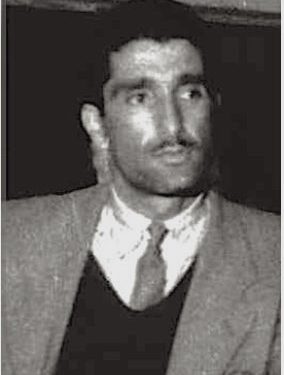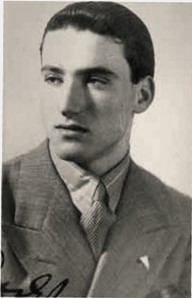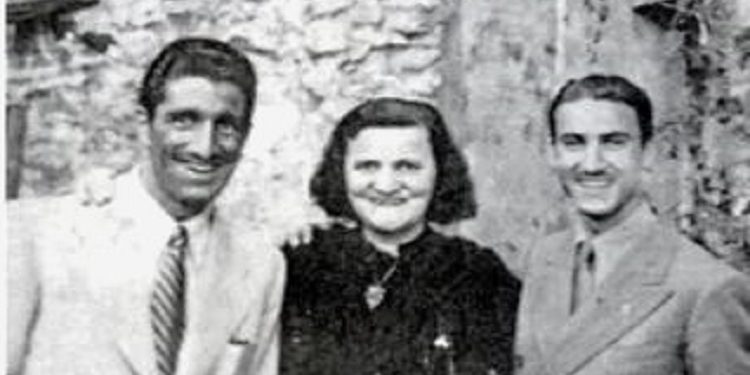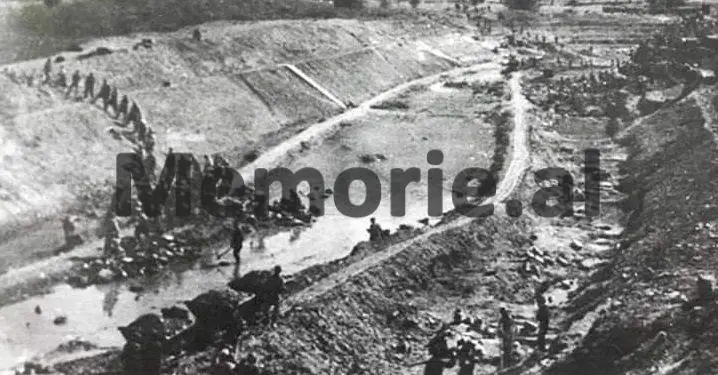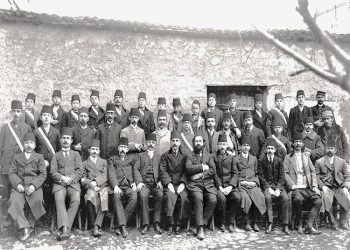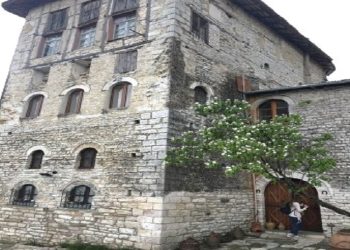The Long and Hopeless Journey for a Shelter: The Testimony of Fehime Pipa
Memorie.al / For four years, he lay sick in bed with a fracture in his femur bone, but on that day, he had to get up. A horse-drawn carriage, the only vehicle they were allowed, would take him to the next dwelling where they had been transferred. He was dressed in a suit and tried to hold himself upright as he sat, with his legs outstretched, in the carriage, whose jolts he felt in his broken bones. Three years earlier, they had killed his son, the lawyer Myzafer Pipa. They re-sentenced the other son, Arshiu (Arshi Pipa), whom he hoped would somehow bring him back to life, to 20 years. Tuberculosis had taken one of his daughters, Bedi. He surely felt hopeless, but he did not give up. That day, his wife and other daughters accompanied him. With the unhealed bone, he must have experienced continuous crushing pain over every stone the carriage passed. That evening, he would pass away. His daughter, Fehime Pipa, recounted a part of the family’s suffering after the murder of Myzafer and the imprisonment of Arshi, in a story published in New York in 1991, where she later escaped, together with Arshi.
The Testimony of Fehime Pipa: The Long and Hopeless Journey for a Shelter!
For almost two years, we mourned the death of our brother, Myzafer, and our sister, Bedi. Nevertheless, as the day of Arshi’s release from prison approached, we began to feel some relief. Father, who had been bedridden for four years with a broken femur, brightened up somewhat and began to tell me and my sisters stories from his life.
Mother washed and ironed Arshi’s suit and made him a new tie. He also needed a mattress, but with the financial means we had, we couldn’t buy one. We, the sisters, felt well, especially me, who was secretly, close to Arshi, a thing only Mother knew. We took comfort even though, at least, we now had a roof over our heads.
It was a primitive dwelling on the outskirts of Durrës, at the end of a long road that winter rains made impassable. The house had two rooms and a small stable that we used as a kitchen. We called it “our little castle.” We had found it after the communists had forced us to move three times within six months.
Our first, temporary dwelling was a two-room apartment. While we were living there, a party member, a former student of Arshi’s, was tasked with meeting him in prison. His assignment was to find out whether Arshi had changed in the meantime or not. Arshi had told him that he had nothing to regret.
Soon after this, the Housing Office moved us from the apartment we had to a single room in another building. As soon as we made that room habitable, by washing and painting it, the Housing Office transferred us to another apartment, with a smaller and dirtier room than the previous one. “Where to after this?” we asked when we were forced to leave for the third time.
“This time you will have a separate dwelling, even with a pleasant view. You will not move from it again!” The new dwelling was located in the area called Stan, the poorest area of the city. I went to find it. Along the way, on the hill, dilapidated barracks and shacks followed one another, with front yards where rags were hung to dry. An old woman showed me how to get to the house I was looking for.
I walked through thickets and thorns that covered an alley and reached a meadow filled with wild flowers. In the distance, the sea glittered. The view was amazing. I thought of Father in bed, head propped up with pillows, gazing at the sea opposite. The place would have been quite good for Bedi too.
During our gypsy-like wanderings, Bedi died of tuberculosis, without any family member nearby, in a room at the Tiranë hospital. Her roommate told us that before she died, she felt happy, thinking that we would soon take her home. It was our pretense to ease her pain.
The house in the meadow was about seven meters long and five meters wide. It was covered with aluminum sheet scraps that rattled when the wind blew. The windows were two holes covered with boards. The door was secured with a piece of wire. Inside, it was filled with rotten straw and dung. It had previously been used as a stable.
That night, none of us slept. The next day, I went to the Housing Office to tell them we would not move from the dwelling where we were. One of the employees shouted at me; “What are you expecting, a villa?! It’s true, the house needs repairs, but you can do them, just like you did with the other dwellings!” – “We can’t afford to transform a stable into a house,” I replied, “but even if we could, the faucet is too far away, down in the valley, and the shack has no bathroom, no electric current. Moreover, Father is paralyzed. How can we take him there, where there’s no road?” “By airplane,” he mocked, “pray to God to help you.”
“We have housing problems with our own people,” said another clerk, “if you find another place yourself, we do not object.” The chances of finding another house were very slim. Nevertheless, I contacted Nuçi, a family friend who had helped us in many difficult instances. He spoke to Marku, a party member I knew. We had done “voluntary work” together at the beach. Marku, an epileptic, had a seizure while we were working on a sunny day. I helped him. Marku gave us the address of a family that had a four-room house and a kitchen. “They are friends,” he explained, “but please, don’t mention my name!” The house belonged to a truck driver who lived there with his elderly mother and his childless wife. He was a kind-hearted man.
Father felt relieved in his room: sunny in winter and cool in summer. There, we celebrated the engagement of one of my sisters. I worked in a pasta factory. Bukurushi, who would soon get married, also worked there during the summer holidays. Deti, the youngest sister, sometimes gave private Russian lessons to her classmates. But it was Mother who worked the hardest.
Besides taking care of Father, she found time to make quilts, which she sold to a traveling merchant. When our neighbors had family celebrations, she made them sweets. They rewarded her with milk, food that was difficult to find. Milk and yogurt were the main foods for Father. He no longer used his dentures. They hurt him. We saved the best food for Father and Arshi.
We could never place a flower on the grave of our brother, Myzafer. He was tortured to death, immediately after his arrest in 1946, at the Sigurimi Branch in Shkodër. We did not know, and still do not know, the location of his grave. One market day, as I was going to buy some food for Arshi, I took a bag in which I had placed a blouse and the wallet with the ration tickets and money, and set off for the shop.
Only jam and cheese were left in the shop. I ordered two kilograms of both and started looking for the money to pay. The wallet was not in the bag. Like crazy, I emptied it, searched the pockets of the blouse, the wallet was not there. I went back and searched several times around the shop. When I lost hope, I set off desperately for home, dragging my feet through the rain. Besides the money we had barely saved, the wallet also contained three bread tickets for October, which had just begun. Exhausted and completely soaked, I reached where the main road intersected with our alley.
Suddenly I saw a black object on the ground that at first seemed like a piece of rubber. It was the wallet. I was sure it was my wallet, and the contents must have been inside, as no Albanian, at that time, would throw away an empty wallet, no matter how old and torn it was, but I was afraid the rain might have ruined the tickets and the money.
But no. Mother had wrapped them in cellophane. Earlier, it seems, when I had pulled the blouse out of the bag to wear it, the wallet must have fallen out. Three hours had passed since then. People, donkeys, and mules might have stepped on it, but fortunately, they hadn’t noticed.
On an afternoon in November 1947, when my sister Bukurushi and I were returning home, we saw a “Jeep” stop in front of the General Prosecutor’s Office. Two guards got out of it and opened the prisoner’s gate. Our brother, Arshi, came out of it, in pajamas and slippers. As he got out of the “Jeep,” he turned his head, looked at us, and entered the building.
We froze. Arshi had been taken out of the infirmary. Why? He was supposed to be released in three months! We stood in front of the building until it got dark. The streets emptied and the streetlights turned on. At this time, two guards came out of the building and ordered us to leave. We didn’t tell Father. The rest of us lived in anxiety until the day of the visit came.
We went to the prison, not knowing what awaited us. We asked to meet Arshi. They called his name. He was alive!
Arshi was judged for the second time. During the trial, he learned of the death of his brother, Myzafer. He scolded us for not notifying him. We had not told him to spare him further distress, while we had smothered the grief within ourselves. When we visited Arshi in prison, we took off our mourning clothes and wore normal ones. When Arshi asked us about Myzafer, we told him he was fine, holding our sorrow in our hearts. In July 1948, Arshi was sent to the infamous forced labor camp of Vloçisht. A few months later, in November 1948, he was sentenced for the second time to twenty years and transferred to the prison fortress of Gjirokastër.
In the autumn of 1949, the communist regime in power moved about twenty “declassed” families from Durrës and settled them in empty houses on the beach. We were, naturally, among them. We requested that Father be transported by ambulance. The Party refused. We hired a horse-drawn carriage, the only means of transport that could be found. For the first time in four years, Father, dressed in a suit, was forced to sit upright. In the carriage, he kept his legs stretched out in front of him.
We, the sisters, followed the carriage. The beach was about five kilometers away from the house we left. Since the road was bad and potholed, we begged the coachman to go slower, so as not to shake Father. But he wanted to return to Durrës before the rain started, and therefore, he did not grant our plea. At one point, Father turned pale. He was in pain. The coachman stopped the carriage.
Mother rested Father’s head on her lap. When we arrived at the new shelter, it was night and raining. Father died that very night from a heart attack. To bury him, we had to sell his pocket watch. / Memorie.al
Translated by Ilir Hashorva.
The article was published in 1991, in the magazine Albanica, in New York.




